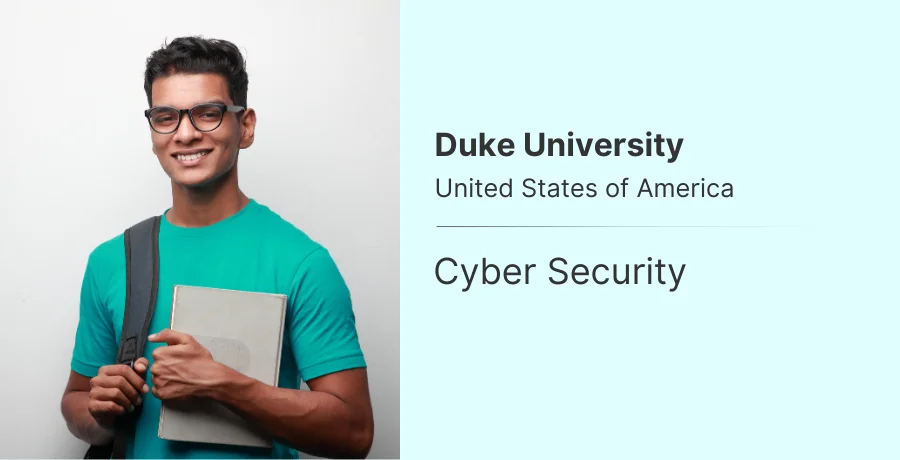Table of Contents
- Highlights
- Why Study Cyber Security at Stanford University USA?
- Stanford University Cyber Security Rankings
- Stanford University Cyber Security Acceptance Rate
- Popular Cyber Security Courses at Stanford University USA
- Admission Requirements to Cyber Security at Stanford University USA
- Cost of Cyber Security at Stanford University USA for Indian Students
- Scholarships at Stanford University USA
- Job Prospects for Cyber Security at USA
- FAQs – Cyber Security at Stanford University USA
Cyber Security at Stanford University USA – Highlights
Stanford University, located in the heart of Silicon Valley, offers a cutting-edge Cyber Security program that prepares students to tackle the evolving challenges in the digital world. The program combines theoretical knowledge with practical skills, ensuring that graduates are industry-ready.
The city of Stanford itself is a vibrant tech hub, providing students with ample opportunities for internships, networking, and exposure to leading tech companies. The university's state-of-the-art facilities and resources further enhance the learning experience for students pursuing Cyber Security.
Why Study Cyber Security at Stanford University USA?
Stanford University's Cyber Security program is renowned for its rigorous curriculum and distinguished faculty. The program is designed to equip students with the latest knowledge and skills required to excel in the field of cyber security. With a strong emphasis on research and innovation, students are encouraged to explore new solutions to cyber threats.
- Access to top-notch resources and facilities.
- Opportunities for internships and networking with leading tech companies.
- Strong focus on practical skills and real-world applications.
- Located in the heart of Silicon Valley.
Stanford University Cyber Security Rankings
| Ranking | Organization |
|---|---|
| 1 | US News and World Report |
| 2 | QS Ranking |
| 3 | THE Ranking |
| 4 | ARWU Ranking |
Stanford University Cyber Security Acceptance Rate
- Stanford University has a highly competitive acceptance rate for its Cyber Security program.
- The acceptance rate is typically below 5%, reflecting the program's prestige and high standards.
Popular Cyber Security Courses at Stanford University USA
Bachelor’s Programs
- Bachelor of Science in Computer Science: This program provides a strong foundation in computer science with a focus on cyber security principles and practices.
- Bachelor of Science in Electrical Engineering: This course includes modules on cyber security, preparing students to address security issues in electronic systems.
Master’s Programs
- Master of Science in Cyber Security: This advanced program covers various aspects of cyber security, including network security, cryptography, and risk management.
- Master of Science in Computer Science – Cyber Security Specialization: This specialization focuses on in-depth knowledge and research in the field of cyber security.
Admission Requirements to Cyber Security at Stanford University USA
Admission to the Cyber Security program at Stanford University is highly selective. Applicants must demonstrate strong academic performance and a keen interest in cyber security.
Entry Requirements
- Stanford University Cyber Security entrance exam: Applicants may need to take specific entrance exams as part of the admission process.
- Stanford University Cyber Security entry requirements: A strong academic background in relevant subjects is essential.
Eligibility Criteria
Applicants must have completed their secondary education with excellent grades in subjects such as mathematics, computer science, and related fields. In addition, applicants should demonstrate a strong interest in cyber security through relevant coursework, projects, or work experience.
For postgraduate programs, a bachelor’s degree in a related field is required. Applicants should also have a solid understanding of fundamental concepts in computer science and cyber security.
Documents Required
- Academic transcripts: Official records of previous academic performance.
- Letters of recommendation: Typically from teachers or professionals who can attest to the applicant’s abilities and potential.
- Statement of purpose: A written statement outlining the applicant’s goals and motivations for pursuing the program.
- Resume/CV: A detailed account of the applicant’s academic and professional experiences.
- English proficiency test scores: Required for non-native English speakers.
Proficiency Test
Applicants whose first language is not English must provide proof of English proficiency. Accepted tests include the TOEFL, IELTS, and PTE Academic. Minimum score requirements vary by program, so it is essential to check the specific requirements for the Cyber Security program at Stanford University.
Visa Process
- Acceptance letter: Obtain an acceptance letter from Stanford University.
- I-20 form: Receive the I-20 form from the university, which is required for the visa application.
- SEVIS fee: Pay the SEVIS fee and keep the receipt for your records.
- Visa interview: Schedule and attend a visa interview at the nearest US embassy or consulate.
Cost of Cyber Security at Stanford University USA for Indian Students
Tuition Fees
The tuition fees for the Cyber Security program at Stanford University vary depending on the specific course and level of study. On average, students can expect to pay between $50,000 and $70,000 per year.
Cost of Living
The cost of living in Stanford can be relatively high, with expenses for accommodation, food, transportation, and other essentials ranging from $20,000 to $30,000 per year. It is essential to budget carefully to manage these costs effectively.
| Expense | Estimated Cost (per year) |
|---|---|
| Tuition Fees | $50,000 - $70,000 |
| Accommodation | $10,000 - $15,000 |
| Food | $5,000 - $7,000 |
| Transportation | $2,000 - $3,000 |
Scholarships at Stanford University USA
Stanford University offers a range of scholarships to support students in their academic journey. These scholarships are based on merit, financial need, or specific eligibility criteria.
- Stanford Graduate Fellowships: These fellowships provide financial support to outstanding graduate students across various disciplines.
- Knight-Hennessy Scholars Program: This program offers full funding for graduate students, covering tuition, living expenses, and other costs.
Job Prospects for Cyber Security in USA
Graduates of the Cyber Security program at Stanford University have excellent job prospects in the USA. The demand for cyber security professionals continues to grow, with numerous opportunities in various sectors.
| Job Role | Average Salary (per year) |
|---|---|
| Information Security Analyst | $90,000 |
| Cyber Security Consultant | $100,000 |
| Network Security Engineer | $110,000 |
| Chief Information Security Officer (CISO) | $150,000 |
FAQs – Cyber Security at Stanford University USA
- Can I work while studying Cyber Security at Stanford University?
Yes, international students can work on-campus up to 20 hours per week during the academic year and full-time during breaks. - What are the advantages of studying Cyber Security at Stanford University?
Stanford University offers a top-ranked program, access to cutting-edge resources, and opportunities for internships and networking in Silicon Valley. - What is the average salary for Cyber Security graduates from Stanford University?
The average salary for Cyber Security graduates ranges from $90,000 to $150,000 per year, depending on the job role and level of experience. - How long is the Cyber Security program at Stanford University?
The duration of the Cyber Security program varies, with bachelor’s programs typically lasting four years and master’s programs lasting one to two years. - What exams are required for admission to the Cyber Security program at Stanford University?
Applicants may need to take standardized tests such as the GRE or TOEFL, depending on their educational background and program requirements. - What are the popular Cyber Security courses at Stanford University USA?
Popular courses include the Bachelor of Science in Computer Science, Bachelor of Science in Electrical Engineering, Master of Science in Cyber Security, and Master of Science in Computer Science – Cyber Security Specialization.












